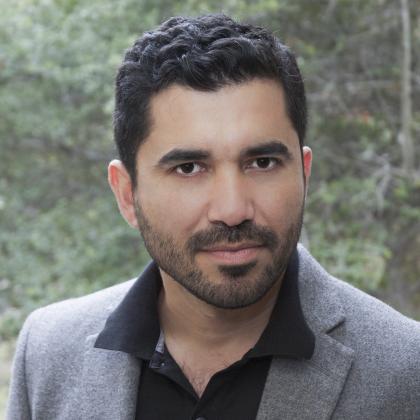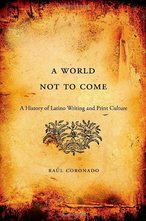Raúl Coronado
Associate Professor
Chicanx Latinx Studies, Comparative Ethnic Studies
Histories of sexuality & of the academic disciplines, Latina/o intellectual & literary history, The comparative history of writing in the colonial and 19th century Americas, Theories of modernity & postcolonialism
Ph.D., Stanford University, 2004, Modern Thought and Literature
B.A. with Special Honors, University of Texas at Austin, 1994, Honors Humanities Program

Office:
528 Social Sciences Building
Spring 2023: Tuesday 2:30-4pm via Zoom and by appointment
If you'd like to sign up for office hours, please use this link.
Contact:
More Info:
If you’d like to sign up for office hours, please use this link.
Bio & Research Interests
My teaching and research interests are in Latina/o literary and intellectual history, from the colonial period to the 1940s. In a sense, this field and period allow—indeed force—us to rethink the literature of the Americas in a transnational, hemispheric framework. That is, Latina/o literature has usually been described as a twentieth-century phenomenon, emerging for the most part during the Civil Rights movements of the 1960s and 70s. Yet a return to the literary-historical archive reveals a quite different genealogy. Beginning in the late eighteenth century, Spanish Americans—including Mexicans, Cubans, Puerto Ricans, Venezuelans, and Colombians—sought refuge in the U.S. and used the printing press, especially in Philadelphia, Charlottesville, and New Orleans, to foment support for the independence of their Spanish American countries. Likewise, during the first half of the nineteenth century, the printing press arrived across what is today the U.S. Southwest and gave birth to a vibrant and often belligerent print culture. It was through these published texts that ideas associated with modernity were, for the first time, debated and developed in print among Latinas/os, ideas such as representative government, the rights of citizen-subjects, and the power of the press to reconfigure society. By returning to the archive, rethinking the category of literature, genres, and disciplines, and engaging with the theoretical-historical problematic of modernity and colonialism in the Americas, we can begin to imagine alternative historical geographies for a literature of the Americas, one where the seemingly impermeable barrier between U.S. and Latin American literary and intellectual history begins to disintegrate in U.S. Latina/o studies.
My first book project, A World Not to Come: A History of Latino Writing and Print Culture (Harvard 2013), explored these questions by focusing on the transnational development of a print and literary culture in Texas. However, rather than take literature as the beginning object of study, my teaching and research historicizes the process by which certain genres came to be identified as literature. Consequently, I emphasize the contemporary, social meaning of writing. The nineteenth-century specialization of knowledge associated with modernity gave shape to our contemporary definition of literature as a genre distinct from political writing, journalism, and history, for example. By modernity, I invoke the Enlightenment’s dream: the notion that society could, with the benefit of studied knowledge, progress indefinitely. But the spread of modernity from Europe to the Americas was never merely a question of reproducing an original blueprint. How democratic institutions unfolded, how writing fragmented and became specialized into political and aesthetic spheres, and the subjective transformations required for these changes all depended on who and what existed at the local level as well.
My teaching balances the need for coverage and theoretical analysis; it focuses on and is attuned to the historical specificities of a particular region of the Americas—the U.S.-Mexico border—but simultaneously provides new insights into the literary and cultural legacies of modernity and colonialism in the Americas. In the next several years, my teaching will focus on the development of a US Latina/o public sphere; how 19th and early 20th century Latinas/os engaged with and theorized the development of a modernity in the US Southwest, New Orleans, and the East coast; Latina/o intellectual history and cultural studies; and comparative postcolonial literatures and theories of nineteenth-century Americas. I also have longstanding interests in queer and feminist theory, with a particular focus on how women of color have theorized the queer subject and the emergence of queer Latina/o print culture and publics.
Courses Taught
Structures of Latinx Feeling: From Latin American to Latinx
The History of Latinx Sexuality
Divergent Modernities
History and Narrativity
Humanities Methods in Ethnic Studies
Structures of Feeling: The History and Politics of Affect
The Written Word in the Postcolonial Americas
The Transnational History of Latina/o Writing
Queer Latinx Studies: Theory in the Flesh
Select publications
• “Liberty and Catholic Political Philosophy: The 1813 War of Independence from Spain,” In the Shadows of the Eagle: Reflections on the Texas Revolution, 1813-1836. Texas A&M Press, forthcoming.
• “Texas-Mexican Women and the War of Independence from Spain: Memory, Writing, Forgetting.” American Contact: Intercultural Encounter and the History of the Book. University of Pennsylvania, forthcoming.
• “Nationalism,” Keywords for Latina/o Studies. New York University Press, 2017. 147-151.
• “Communing with the Past,” PMLA 131.3 (2016): 765-773. http://search.ebscohost.com/login.aspx?direct=true&db=hlh&AN=118800786&site=eds-live.
• “Historicizing Nineteenth-Century Latina/o Textuality,” The Latino Nineteenth Century. New York University Press, 2016.
• A World Not to Come: A History of Latino Writing and Print Culture. Harvard University Press, 2013. https://www.amazon.com/World-Not-Come-History-Writing/dp/067497090X
• “The Poetics of Disenchantment: José María Heredia and the Tempests of Modernity,” J19: The Journal for 19th-Century Americanists. Forum on 19th-century poetry and poetics. 1.1 (April 2013).
• Contributing Editor. Heath Anthology of American Literature, Vol. A: Beginnings to 1800 and Vol. B, Early Nineteenth Century: 1800-1865. 2012, 7th edition.
• Translation. José Álvarez de Toledo. Jesús, María, y José (Philadelphia, 1812), in Heath Anthology of American Literature, Vol. A: Beginnings to 1800. 2012, 7th edition.
• “The Aesthetics of Our America,” American Literary History 20.1-2 (Spring-Summer 2008).
• “Bringing It Back Home: Desire, Jotos, Men, and the Sexual/Gender Politics of Chicana and Chicano Studies.” The Chicana/o Cultural Studies Reader, ed. Angie Chabram-Dernersesian. New York: Routledge, 2006.
• “Selena’s Good Buy: Texas Mexicans, History, and Selena Meet Transnational Capitalism,” Aztlán: A Journal of Chicano/a Studies 26.1 (Spring 2001): 59-100.
• “Summer 1986.” Virgins, Guerrillas, and Locas: Gay Latinos Writings about Love, ed. Jaime Cortez. San Francisco: Cleis, 1999.
• “Unthinkable Bodies (Un)Made: Notes Towards a Historicizing of Chicana/o Sexuality.” Expanding Raza World Views: Sexuality and Regionalism. Proceedings of the National Association for Chicana & Chicano Studies Conference, April 1999.
Book Reviews
• Review of Migrant Longing: Letter Writing Across the U.S.-Mexico Borderlands, Miroslava Chávez-García. Journal of American History (December 2020).
• Review of A Separate Star: Selected Writings of Helen Hunt Jackson, ed. Michelle Burnham. Western American Literature(Summer 2010).
• Review of Life in Search of Readers: Reading (in) Chicano/a Literature, Manuel M. Martín-Rodríguez. Modern Philology (May 2007).
Awards & Honors
• John Simon Guggenheim Memorial Fellow, 2021 (deferred 2022)
• Robert C. Ritchie Distinguished Fellowship in Early American History, The Huntington Library, 2021 – 2022
• Humanities Fellowship, Townsend Center for the Humanities, UC Berkeley, 2021 – 2022 (declined)
• Templeton Lecture, “History as Presence,” UC Davis, April 2019
• Kanner Lecture, “What Historical Narratives Offer Us,” English Department, UCLA, Nov 2018
• Presidential Address, Latina/o Studies Association, Pasadena, July 2016
• National Association for Chicana/o Studies, Best Book Prize, 2015
• Texas Institute of Letters, The Renato Ramírez Award for Best Scholarly Book, 2015
• American Studies Association, John Hope Franklin Publication Prize for Best Published Book in American Studies, 2014
• Susanne M. Glasscock Humanities Book Prize for Interdisciplinary Scholarship, Texas A&M Center for Humanities Research, 2014
• Texas State Historical Association, The Kate Broocks Bates Award for Historical Research, 2014
• Philosophical Society of Texas Award of Merit for Non-Fiction, 2014
• Society for U.S. Intellectual History, Annual Book Award Honorable Mention, 2014
• Western Literature Association, Thomas J. Lyon Award for Book Award in Western American Literary and Cultural Studies, Honorable Mention, 2014
• Modern Language Association, Best First Book Prize, 2013
• Bill and Rita Clements Fellowship for the Study of Southwestern America, William P. Clements Center for Southwest Studies, Southern Methodist University, 2010
• Ford Foundation, Postdoctoral Fellowship, 2009
• Summer Seminar Fellow, National Endowment for the Humanities, CUNY, 2005
• Theodore and Frances Geballe Fellowship, Stanford University Humanities Center, 2003-2004
• Research Institute of Comparative Studies in Race & Ethnicity Fellowship, Stanford University, 2002-2003
• J. William Fulbright – Alfonso García Robles Fellowship, Instituto de Investigaciones Históricas, Universidad Nacional Autónoma de México, 2002
• Ford Foundation, Dissertation Fellowship, 2001-2002
• Jerry I. Porras Visionary Leadership Award, El Centro Chicano, Stanford University, 2001
• Ford Foundation, Predoctoral Fellowship, 1996-2000
